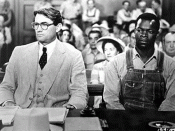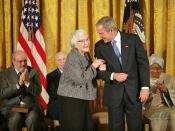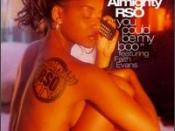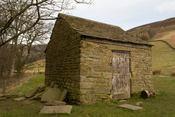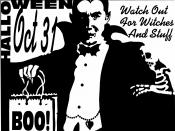The mockingbird; he doesn't have a vice bone in his body; they keep to themselves all but for the period they sing to their heart's content. Would a sufficient act be to take the breath they breathe and stop the beat of their heart? What kind of animal could perform a deed such as that? What would be the purpose behind this slayer's action? Arthur Radley was his name; few, however, still associate him with that title. The more popular term for Mr. Arthur is Boo Radley. Boo never sets foot outside of his desolate house into the intolerable gaze of Maycomb County's residents; though it's not so much he's incapable or leaving the house, but lacking the desire to do so. "Arthur Radley just stays in the house that's all.' said Miss Maudie. 'Wouldn't you stay in the house if you didn't want to come out?' [page 44]" Obvious evidence stating that Boo Radley has no intentions of stepping foot outside of his mausoleum in visible light.
" 'Yessum, but I'd wanta come out. Why doesn't he?' [page 44]" The simple question that could be answered by any civil person who truly sought an answer; the people of Maycomb have a plague, an epidemic fogging their mind that won't allow them to answer their own question. Boo will sacrifice his privacy, his pride, his life to help those who are in need; indefinitely Scout. "You're right. We'd better keep this and the blanket to ourselves. Someday, maybe, Scout can thank him for covering her up." Says Atticus, " 'Thank who?'" said Scout, " 'Boo Radleyâ¦' [pages 81-82]"says Atticus. Why would Boo come outside in freezing cold weather and risk his identity to be discovered for one child who has even ridiculed him before? He does this because Scout is in need, she needs warmth, and if Boo can provide it (which he can), he will. The time is night, the scenery is but a mass of darkness, the atmosphere is dread, but the actions are quick and swift. In a matter of minutes a man later identified to be as Bob Ewell has attacked Jem and Scout on Halloween; another being dubbed Boo has rescued Scout, retrieved Jem (whose arm is broken) and killed Ewell. This man is not ordinary, again he risks his identity to be exposed by Scout, Jem, and possibly Mr. Ewell, but furthermore, he risks freedom. One is disposed of, the other oblivious, but Scout is soon well aware that the Phantom she beholds is in fact Boo; yet he entrusts himself with a child to save two lives.
Tom Robinson: he is framed for a crime and looked down upon by others, he doesn't stand a chance against a judicial system which is supposed to give mankind a fair trial to defend or convict a person of a felony; all because of the color of his skin. Robinson is a church-going man who minds himself and neighbors, but more importantly he sacrifices his pride to help another. " 'She'd call me in suh. Seemed like every time I passed by yonder she'd have some little somethin' for me to do - choppin' kindlin', totin' water for her. She watered them red flowers every day - '"says Tom, "'Were you paid for your services?" asks Atticus " 'No suhâ¦' [page 81]". Plainly this man wanted nothing more than to help this deprived girl who never had anyone civilized enough to converse with. But it's not enough that he helps her, no, then this girl who he devotes his time and energy (without pay which has been proven) to helping her for the simple satisfaction of she; then she must exploit him, frame him with a crime he wouldn't dream of committing under circumstances which are impossible for him to escape. Yes, this woman has betrayed a servant, a friend; doesn't Mayella Ewell know it's a sin to kill a mockingbird? Obviously these two "Mockingbirds" are in parallel; they share similar character and personality traits. But why are they dubbed as Mockingbirds"? What have they that make these characters so similar to a "Mockingbird" that it's appropriate to call them such? First, to consider what they haven't. These men have no desire to destroy, corrupt, or harm; they produce no evil, they do not contribute to the disease that has swept Maycomb, they harbor no traits of ill will with the determination to deprive others. They contain attributes such as the will to help others unconditionally, to put themselves on the line for another, to risk their freedom and more importantly their life for the satisfaction or existence of someone else. In the end it comes down to this: a Mockingbird has more or less the attributes of these and men and vice versa, but they share that burning desire to help the surrounding people while sitting on a tree branch, coming into the open, entering a forbidden area, just to be shot, exposed, exploited.
All in all, the Mockingbird is a very important motif in this novel, he shows that sometimes by helping others you may sacrifice yourself, but more importantly, the consequences are less painful when you know in yourself you have fulfilled your duty to your fellow neighbors and friends.
